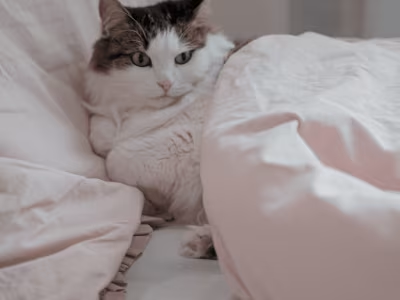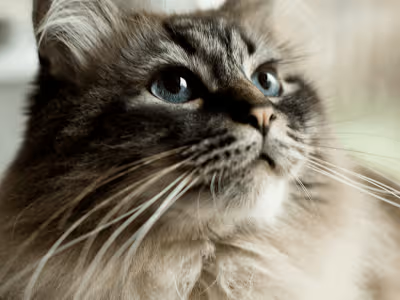Blog: Human foods that are dangerous to cats
Human foods that are dangerous to cats
Cats are often very similar to humans but treats that are tasty to us can be dangerous to them. Some common human foods that are poisonous to cats include chocolate, grapes, raisins, onions, garlic, and spices like cinnamon, oregano, and paprika. These foods contain compounds known as cyanogenic glycosides which are toxic to cats when eaten in large quantities. If your feline eats these foods in small quantities over time, it can build up in their system and cause serious health issues such as vomiting, diarrhea, or even kidney failure. Household plants also have the potential to be toxic if ingested by a cat. For example; lilies have a high amount of oxalic acid which is poisonous to cats and can cause them acute kidney failure if they eat large amounts of it. There are also other poisonous plants that are commonly found outdoors, such as holly and ivy, and you should be careful with them as they contain saponins which can be harmful to animals.
Many people think of cats as being carefree, playful, and curious animals. The truth is that these creatures' digestive systems are quite delicate, and some diets can seriously hurt them. If you have a cat, it's crucial that you are aware of which foods to steer clear of. In this article, we’re going to review some of the most common foods that you should avoid giving your cat.
Vegetables that are poisonous to cats
Most vegetables are safe for cats to eat, but there are a few that are toxic so you should be more cautious if you want to include veggies in their meals. Some common vegetables that are harmful to cats include spinach, potatoes, tomatoes, and eggplant.
Spinach is the most common one of the bunch. This leafy green vegetable can contain saponins which cause gastrointestinal problems in cats. Even small amounts of this plant can cause a serious problem for your cat’s digestive system. The best thing to do is not serve spinach at all or give it in very small amounts.
Potatoes, Eggplant, and tomatoes also contain solanine which can be harmful if ingested by cats. Solanine causes vomiting, diarrhea, and even death if consumed in large quantities by pets. The best way to prevent these vegetables from being toxic to your cat is simply not feeding them at all. Or seek advice from your veterinarian if you are unsure.
Common fruits that are poisonous to cats
Just like humans, cats are attracted to fruits, but some of them might be poisonous to them. These include cherry, apple, avocado and grapefruit, apricots, pears, and peaches.
Cherry pits can cause kidney failure and liver damage as they contain cyanide. Apples are not cat-friendly fruit either, so keep them away from your pet. While avocado contains persin, an alkaloid that can cause severe gastrointestinal upset. Grapefruits are also toxic for your lovely felines because they contain glycoside amygdalin which acts like cyanide when ingested by animals, causing renal failure or coma.
Apricots are poisonous to cats because they contain cyanogenic glycosides. This makes them unpalatable for felines and can cause them to experience vomiting, diarrhea, and even seizures. Pears contain amygdalin which is also toxic to cats and could lead to unpleasant effects such as nausea and vomiting. Lastly, peaches have high levels of hydrogen cyanide which could lead to death in a short period of time if ingested by your cat, so beware.
Other food that is poisonous to cats
Other foods you might want to be careful with are raisins, onions, garlic, and spices like cinnamon, oregano, and paprika.
Cats are very sensitive to this food which can cause an upset stomach or diarrhea. For instance, grapes and raisins contain high concentrations of certain compounds that can cause kidney failure in cats, especially if they're given in large amounts.
Your felines should also avoid eating raw meat and raw eggs. Consuming raw eggs and meat can cause salmonella or E.coli poisoning in your cats. Additionally, raw eggs contain an enzyme that could cause issues with their skin and coat. Also, keep your cat from consuming raw bones, as doing so could cause suffocation, as well as digestive or dental problems.
Keep your cats away from chocolate and caffeinated drinks. These treats contain methylxanthines, which can raise body temperature, tremble muscles, disrupt heart rhythm, induce gastrointestinal pain, increase thirst, and even lead to seizures.
What to do if your cat eats human food that might be harmful?
Your cat will typically vomit and have diarrhea if these are consumed in small amounts. When you see these abnormal symptoms, It's time to take them to the vet for a checkup and make sure you have a record of what’s been eaten so that your vet can provide the appropriate treatment, normally something that will help flush out your cat’s system and have him monitored for any future complications. If your pet has eaten something outside of their normal diet and you’re not sure what it is, you should take a picture of the food and send it to your vet. It is crucial that you have your cat treated as soon as possible.
Conclusion
It can be challenging to know what to do when your cat consumes human food that is harmful to them, so it’s best to feed her cat food that is proven to be safe and nutritious, as in some situations, food poisoning might lead to the death of cats in a very short period of time. The best thing to do is keep your cat away from anything you are not sure about. Don't just automatically assume that your cat will know not to eat it and will avoid it in the future. When in doubt, consult your vet before feeding anything suspicious to your cat, or only choose the ones that you know are absolutely safe. Keep a list of foods to avoid in the kitchen if you need a quick reminder before feeding.
Like this project
Posted Feb 19, 2023
This blog will educate cat owners to recognize and avoid feeding their cats foods that can be harmful to their health.
Likes
0
Views
6






